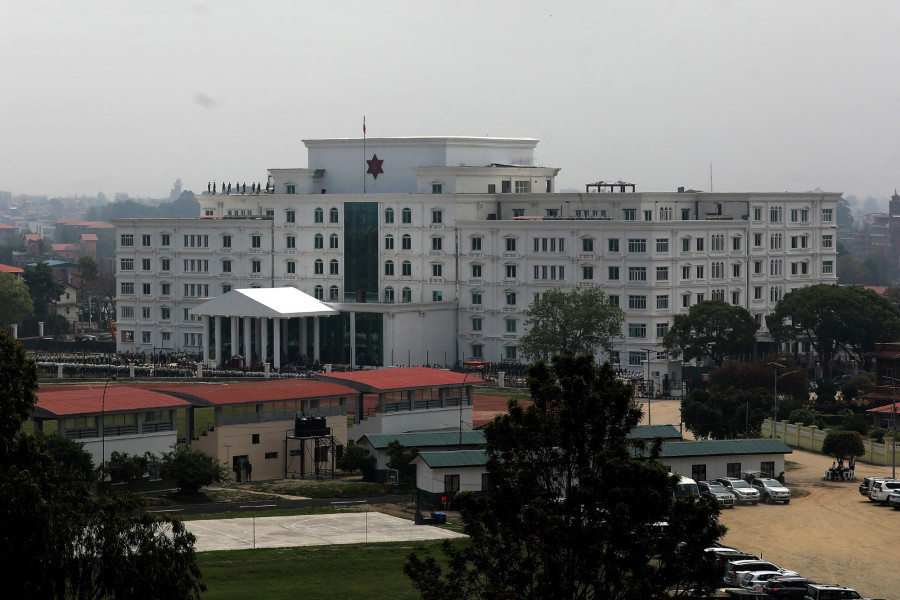National
Nepal Army is amending laws so it can get into commercial activities
Eyeing projects with high returns, the Army wants to invest the billions it has in its welfare fund in hydropower projects.
Binod Ghimire
Despite mounting criticism that the Nepal Army is increasingly getting involved in commercial activities not befitting the armed forces, the national defence force is amending the Nepal Army Act to allow it to invest in commercial ventures as a promoter, furthering its entry into business.
The Nepal Army Act 2006 acts as a legal barrier for the Army’s investment in mega projects like hydropower, or in the banking sector. Though the Army is currently making millions of rupees annually out of the deposits it has in various commercial and development banks, top Army officials have expressed dissatisfaction with the returns. An amendment to the Nepal Army Act would give it leeway to make investments in businesses that yield high returns.
Judge Advocate General Ranta Prakash Thapa, who is in charge of the Army’s legal department, said that the amendment will allow the national defence force to invest as a promoter.
“But there will also be a clause making it mandatory to obtain the government’s consent before making any such investment,” Thapa told a news conference on Friday.
The Army has been pushing for the government to make an amendment to the Act towards this end for the past few years. The Army has prepared the amendment draft.
Once the amendment is approved, it can invest without preconditions, like any other private entity. The Army’s current investment is in areas including fuel pumps, schools, medical college and bottled water companies, all of which it says provide benefits for the Army itself and hence, are not purely commercial ventures.
But the planned amendment will allow the Army to make free use of the billions of rupees it has in its welfare fund. According to a report published on Friday, the Nepal Army Welfare Fund has Rs 38.57 billion as deposits in different banks, along with an investment of Rs 5.64 billion in different sectors.
The army wants to invest in hydro projects and in the Treasury bill, which will provide more returns than the interest that banks pay. Even without the amendment, the Army had proposed to the Department of Electricity Development that it be allowed to invest in the building of the 25 MW Dudh Khola and 32 MW Bhimdang Khola hydropower projects. Among these two Manang-based projects, the department will most likely grant the Army the Bhimdang Khola project.
“The plan to invest in hydro projects has not moved forward in the lack of a required amendment to the Army Act,” Brigadier General Sagar KC, chief of the welfare fund, told the media. The Army will further explore areas for investment once legal hurdles are cleared. The Army has been saying that it needs to invest in area of high returns to support welfare schemes that are targeted towards in-service and sitting Army staff and their families. KC said the Army spent Rs 6 billion on medical services, income-generating projects and cash incentives for around 400,000 beneficiaries last fiscal year.
Security analysts, however, do not believe that the national defence force, the last resort for national security, should be allowed to invest in commercial ventures.
“The Army is expanding its business in the name of supporting welfare activities. The government, therefore, should allocate a budget for welfare activities and detach the Army from commercial activities,” former Brigadier General Prem Basnyat, who has written a number of books on the Nepal Army, told the Post. “The Army’s pursuit of money could hamper its professionalism.”
Basnyat said that the government should form a task force to study how welfare activities are carried out in different countries and extend its support to the Nepal Army accordingly.
In recent times, a number of the Army’s decisions have invited much criticism from the public. Its move to lease the historical Tri-Chandra Military Hospital for business purposes, operation of petrol pumps in different parts of the country, and the sale of its land to its staff have all been controversial. Critics say that the focus of the Army is gradually shifting towards commerce.
The Army is also increasingly getting involved in the construction sector. The government’s decision to authorise the force to construct the Kathmandu-Tarai expressway also drew criticism from several quarters.
***
What do you think?
Dear reader, we’d like to hear from you. We regularly publish letters to the editor on contemporary issues or direct responses to something the Post has recently published. Please send your letters to [email protected] with "Letter to the Editor" in the subject line. Please include your name, location, and a contact address so one of our editors can reach out to you.




 8.79°C Kathmandu
8.79°C Kathmandu















